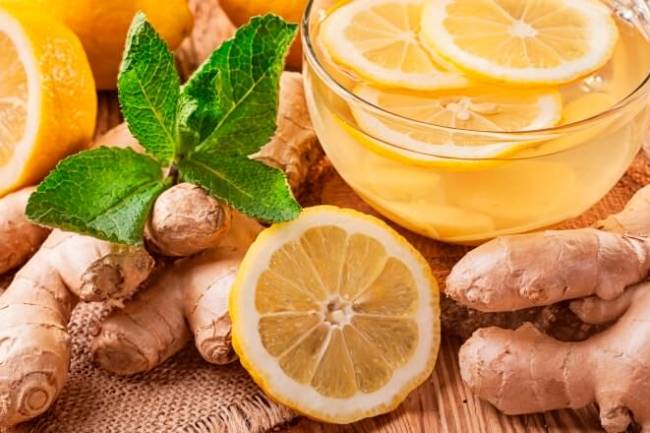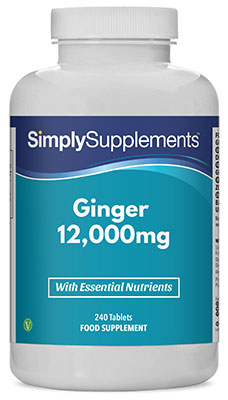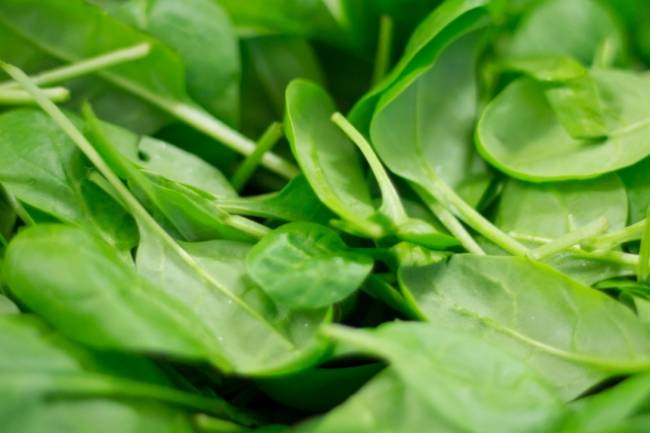Top Supplements for Gut Health

Our digestive systems can be notoriously sensitive, not only to the foods we eat but to other conditions and changes within the body. With things like stress and intolerances, the carefully-maintained environment inside the stomach and intestines can get thrown out of balance. In small amounts this causes discomfort and minor conditions to flare up, but neglecting these signs can have a knock-on effect, triggering more severe gut and stomach upsets.
Keeping a sharp eye on your diet and lifestyle can usually extinguish these stomach grumbles, but what if you need an extra hand in keeping everything calm? We’ve made a list of some of the top supplements for your gut, which can assist with easing a range of conditions, from IBS to motions sickness to severe flatulence. Settle the storm in your stomach with some of these…
Ginger
One of the most popular condiments in the world, ginger is also an excellent supplement for those trying to keep their food down. Coming from China and India, it was a hot (and expensive) commodity, with it being traded to the Romans for its medicinal qualities. One common use was to fight nausea, as well as things that cause it, like seasickness. This legacy continues today, with ginger being a go-to supplement for motion sickness and nausea of all kinds.
Ginger supplements usually take the extract from the plant’s root and make it into a tablet. Research have found that two groups of chemicals called gingerols (funnily enough) and shogaols, and that there is some scientific basis for its nausea-fighting claims. Ginger supposedly helps break down and gas in the intestines, which works towards putting the organs at ease. A huge amount of research supports it as a general antiemetic (medicalese for a nausea fighting drug), with plenty also supporting its seasickness-stabilising abilities (although there are studies that suggest it has little impact).
One popular use for ginger as an antiemetic is during pregnancy, where it can help with morning sickness. In fact, a survey of obstetrician and gynecologists in 2001 showed that about 52% of them suggested using ginger over other morning sickness aids.
Activated Charcoal
Another historical medicine, charcoal has been used for centuries for a range of conditions, from poisoning to stomach cramps. Most commonly our ancestors would be using the kind that would be found left over from fires – nowadays, however, we can treat charcoal making it purer and more effective as supplements. One of these treatments is activation: the act of exposing it to high temperatures to change its structure, making it porous. So porous, in fact, that a single teaspoon of activated charcoal has a greater surface areas than an American Football field.
What this increased surface area means is that the charcoal can absorb other liquids and gasses in the pores. When taken in capsule form it can help deal with liquids and gasses like poisons and intestinal gas. If you’re having trouble with high levels of flatulence, then activated charcoal might be able to help.
The European Food Safety Authority (EFSA) supports the use of activated charcoal for “excessive intestinal gas accumulation and reduction of bloating.” It’s recommended that capsules are taken on an empty stomach, to avoid stray food particles intercepting and lodging the charcoal’s pores. Don’t take over the suggested amount either, as it might start colouring your stools darker shades. While this is harmless, it may signify that some of that precious charcoal is going to waste – Literally!
Turmeric
This spice has been gaining a lot of traction in the health industry recently. Its popularity mainly stems from its ability to help ease inflammation in the body, the joints getting a lot of focus in this regard. However, it’s that same function that may be the secret to it being an effective supplement for digestion.
While the research is still at an early stage, there’s promising findings to suggest the curcumin (the active ingredient of turmeric) can be used to help digestive discomfort. A lot of time has been spent looking into its effects on Irritable Bowel Syndrome (IBS), welcome relief for something that affects almost one in five adults in the UK. A pilot study with 207 volunteers has found that those taking turmeric had less frequent bouts of IBS, and what bouts they did have were less painful, with two thirds expressing improvement with all symptoms.
There’s more to turmeric’s digestion efforts, though; it can assist with the digestion of fat. This helps the body control the level of triglycerides (fat found in the blood), which can have a positive effect on cholesterol level.
Probiotics
We’ve all heard the yoghurt adverts, about how they contain probiotics, or “good bacteria” for the gut. Did you also know those same bacteria are available as a supplement? It’s a fantastic way to top up if you’re lactose intolerant or dislike the taste of yoghurt (despite their best advertising efforts). This is all well and good but what, exactly, do these billions of bacteria living in your intestines and stomach actually do?
In truth, we don’t know the nitty-gritty details of how probiotics do what they do, but the results speak for themselves. They can help with digestive issues such as IBS and diarrhea caused by viruses or antibiotics. There’s also been other health claims made, about probiotics helping with eczema and fighting against the common cold, but these are much less substantial.
To really feel these effects, supplementary or medical probiotics are ideally required, as those found in foods are less regulated. This means you may not know how much or what type of probiotic you’ll be ingesting. Luckily, probiotics tend to be very safe to take even for pregnant women, with side effects being rare.
These good bacteria in your digestive system also need nourishment, to keep them healthy while taking care of you. This is where prebiotics come in, which leads us to our next supplement…
Psyllium Husks
Made from the seeds of the Indian Plantago ovate tree, psyllium husk supplements are indeed a prebiotic – a material that acts almost like fertilizer to probiotics, fortifying them and their healing abilities. It goes to show, then, that if you take care of your friendly bacteria, they’ll reciprocate in kind.
This isn’t the only trick psyllium husks has up its sleeve. It’s a highly effective fibre supplement, a key nutrient that only 9% of UK adults get their daily requirement. Fibre, of course, helps in the digestion process regarding healthy stools: passing them and balancing their water content. If stool has too much water (and is consequently too hard and uncomfortable to pass) then that can potentially develop into constipation if left unchecked. Too much water in stools can lead to dehydration
As psyllium husks are a soluble fibre, it absorbs water. This means it can absorb water on the way to the large intestines and pass it on when it becomes a part of your stools. A 1995 study showed that, after eight weeks on the supplement, stool weight, consistency and pain on defecation all improved in those suffering from chronic constipation. There’s also been reports of psyllium husks helping with diarrhea too, though there’s been less research into this.
Peppermint
Have you ever stopped to think why mints are offered around at the end of a meal? Not only is it to freshen the breath, but it’s believe to ease the stomach, especially if a particularly large meal’s been had. This might seem like a gimmick, but there’s some truth to be had in this dining tradition.
The oil from the Mentha x piperita plant has been used in a variety of ways since its discovery in the 1700s. Aside from the obvious culinary and cosmetic uses, it’s been used to settle stomachs, being a go-to for ailments like colds and nausea. The research for those two conditions hasn’t been optimistic, compared to the knowledge we have for what it’s primarily used for – irritable bowel syndrome.
The research for peppermint oil’s calming effect on IBS is extensive, much of it in support of the supplement. A 2004 analysis of some of these pieces found that eight out of 12 studies “show statistically significant effects in favor of [peppermint oil].” Considering how IBS doesn’t have a single cause and is unique to each person diagnosed, this is a positive ratio. Another one of its properties is that it eases muscle spasms, which some suspect may help with heartburn and the stomach aches associated with digestive issues.
Conclusion
These supplements can assist in tackling a wide range of stomach and digestion issues; it’s simply a case of choosing which may be the most effective for your particular needs. With all of these supplements, though, it’s important to ask a doctor if you have any concerns or if you’re taking any additional medication. For breastfeeding mothers, it’s recommended that you be very careful when taking these, again, getting a medical opinion before beginning a supplement regime.
It might feel like there’s no chance of relief from stomach discomfort and grumbles, even after lifestyle changes. This select of supplements may be just what you need to give you the last push into good health.
Sources:
https://www.ncbi.nlm.nih.gov/books/NBK92775/
https://www.ncbi.nlm.nih.gov/pmc/articles/PMC4818021/
https://www.ncbi.nlm.nih.gov/pubmed/11246031
https://efsa.onlinelibrary.wiley.com/doi/pdf/10.2903/j.efsa.2011.2049
https://www.liebertpub.com/doi/abs/10.1089/acm.2004.10.1015
https://gut.bmj.com/content/59/3/325.short
https://www.nhs.uk/conditions/probiotics/
https://onlinelibrary.wiley.com/doi/abs/10.1111/j.1365-2036.1995.tb00433.x

 Richard
Richard 























